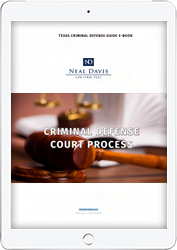When a case has resulted in a deferred adjudication or probation, it may qualify for nondisclosure. An order of nondisclosure is issued by a court and prohibits criminal justice agencies from disclosing to the public any criminal history record information related to the offense. Therefore, the records are sealed and the public cannot view them. Texas Government Code § 411.081(d)
Effective September 1, 2015, the new nondisclosure statute under Chapter 411 of the Texas Government Code went into effect. This new statute radically differs from previous versions.
All nondisclosure petitions cost $28.
The amendments to do not apply to offenses that occur before September 1, 2015.

1. Procedure for automatic nondisclosure for deferred adjudications for certain misdemeanors
Under Section 411.072, a defendant is eligible for automatic nondisclosure for deferred adjudication for certain misdemeanors so long as:
- The misdemeanor offense did not involve the family and was not for kidnapping or unlawful restraint, a sex offense, an assault, disorderly conduct or related offense, public indecency, or organized crime, or
- The court does not make an affirmative finding that nondisclosure is not in the best interest of justice, and
- The defendant has never been previously convicted or placed on deferred adjudication for another offense besides a traffic offense punishable by fine only.
If the defendant qualifies, and is not barred under Section 411.074 (see below), the court “shall” issue an order of nondisclosure. The time for this nondisclosure is immediate if the defendant completes 180 days of deferred adjudication or more; otherwise, if the defendant does a shorter period and is discharged, then the court shall enter a nondisclosure “as soon as practicable” on or after 180 days have passed. The defendant must pay $28 to the clerk before the court issues the non-disclosure order.
Example: Defendant pleads to theft and receives one year deferred adjudication. He has no priors except for traffic tickets. At the time he pleads, the court shall order nondisclosure after he completes his deferred adjudication, unless the court makes some affirmative finding that nondisclosure is not in the best interest of justice. The defendant successfully completes his deferred adjudication. His nondisclosure becomes immediate, assuming he has paid the $28. He therefore does not have to hire an attorney to do a nondisclosure separately, or wait any period of time to receive a nondisclosure, or do anything affirmative other than pay the $28 to receive his nondisclosure.
2. Procedure for probation for certain misdemeanors
The new statute is radical because defendants are now eligible for nondisclosure even if they completed probation, which is a final conviction, for certain misdemeanors.
Under Section 411.073, a defendant is eligible for non-disclosure for certain misdemeanor probations so long as:
- He was not placed on probation for a the offense of a minor driving or operating watercraft under the influence of alcohol, driving while intoxicated, flying while intoxicated, boating while intoxicated, assembling or operating an amusement ride while intoxicated, or organized crime, or
- He completed his probation successfully, and
- He has never been previously convicted or placed on deferred adjudication for another offense besides a traffic offense punishable by fine only.
But there may be a waiting period and he/she must still qualify under Section 411.074 (discussed below).
If the defendant qualifies, the court issues the nondisclosure if it finds, after notice to the State and an opportunity for a hearing, that a nondisclosure is “in the best interest of justice.”
Waiting period
For misdemeanors involving kidnapping or unlawful restraint, sex offenses, assaults, the family, disorderly conduct and related offenses, public indecency, or weapons, the waiting period is two years from the date the probation ended. For all other misdemeanors, such as for theft or possessing drugs, there is no waiting period.
3. Procedure for jail sentences in certain misdemeanors
Also radical in the new statute is a defendant being eligible for nondisclosure if he was sentenced to a jail term.
Under Section 411.0735, a defendant is eligible for non-disclosure for certain misdemeanor jail sentences so long as:
- He was sentenced to a jail term and served it, and
- The sentence was not for the offense of a minor driving or operating watercraft under the influence of alcohol, driving while intoxicated, flying while intoxicated, boating while intoxicated, assembling or operating an amusement ride while intoxicated, or organized crime, and
- He has never been previously convicted or placed on deferred adjudication for another offense besides a traffic offense punishable by fine only.
Further, he must still qualify under Section 411.074 (discussed below).
Again, if the defendant qualifies, the court will notify the State and provide an opportunity for a hearing before issuing the nondisclosure if it approves of nondisclosure.
Waiting period
There is a mandatory two-year waiting period from the time the defendant finished his/her jail sentence.
3. Procedure for deferred adjudication for felonies and other misdemeanors that are not automatic nondisclosures
Under section 411.0725, a defendant may still petition for a nondisclosure of a deferred adjudication if he does not qualify under Section 411.072 above, but there may be a waiting period and he must still qualify under Section 411.074 (discussed below). Whether he has previously been convicted on deferred adjudication is irrelevant. After notice to the State and an opportunity for a hearing, the court issues the nondisclosure only if it finds that a nondisclosure is “in the best interest of justice.”
Waiting periods for nondisclosures in probations and deferred adjudications that are not automatic
For the misdemeanor offense of kidnapping or unlawful restraint, sex offenses, assaults, offenses involving the family, disorderly conduct and related offenses, public indecency, or weapons, the waiting period is two years from the date the deferred adjudication ended. For all other misdemeanors, such as for theft or possessing drugs, there is no waiting period. For felonies, the waiting period is five years from the date the deferred adjudication ended.
Example: Defendant pleads to assault and receives one year deferred adjudication. Because the offense involves an assault, he is ineligible for an automatic nondisclosure. He therefore has to file a petition for nondisclosure. He must wait to two years to file his petition because of the waiting period.
4. Exclusions under Section 411.074
A defendant is eligible to petition for nondisclosure, in cases when it is not automatic, if he meets the above applicable requirements and during the period after the defendant is sentenced or put on deferred adjudication, and during any applicable waiting period, he is not convicted or put on deferred adjudication for any offense other than a traffic fine-only offense.
A defendant is ineligible if he was convicted or put on deferred adjudication, or has ever been convicted or put on deferred adjudication, for:
- An offense requiring sex offender registration, or
- The offense of aggravated kidnapping, or
- The offense of murder, capital murder, trafficking in persons, continuous trafficking in persons, injury to a child/elderly/disabled, violating (or repeatedly violating) bond conditions in family violence/sex assault/stalking/trafficking, or stalking, or
- Any other offense involving family violence, or
- The court affirmatively finds the offense involved family violence.
Consult Houston’s Top Criminal Law Attorneys
The new nondisclosure statute is a profound shift in Texas law and criminal justice. If you have questions about the statute, or would like to enlist the assistance of Houston’s top criminal defense law firm, contact us online or call (713) 227-4444.
Criminal Defense Court Process
FREE E-BOOKLearn all about the legal process and your legal rights.

